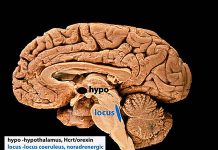
In a study from Yonsei University, scientists found migraine headaches are associated with an increased risk for subsequent dementia.
A migraine is a headache of varying intensity, often accompanied by nausea and sensitivity to light and sound.
Migraine headaches are sometimes preceded by warning symptoms. Triggers include hormonal changes, certain food, and drink, stress and exercise.
Migraine headaches can cause throbbing in one particular area that can vary in intensity. Nausea and sensitivity to light and sound are also common symptoms.
Preventive and pain-relieving medication can help manage migraine headaches.
In the study, researchers used data from the Korean National Health Insurance Health Screening Cohort (2002 to 2019) to evaluate whether patients with migraine have an increased risk for dementia versus individuals without migraine.
The analysis included 44,195 patients with migraine and 44,195 propensity-matched patients without migraine.
The researchers found that the incidence rate of dementia was 139.6 cases per 10,000 person-years in patients with migraine and 107.7 cases per 10,000 person-years in matched controls.
Patients with migraine had a higher risk for all-cause dementia, Alzheimer’s dementia, vascular dementia, mixed or other specified dementia, and unspecified dementia versus matched controls.
The team says that in the present study, patients with migraine had an increased risk of developing all-cause dementia, Alzheimer’s dementia, vascular dementia, and other dementias compared with their risk-set matched controls.
However, further studies are warranted to generalize our findings and elucidate the underlying pathophysiological mechanisms linking migraine and dementia.
If you care about migraine, please read studies about when you should go to the hospital for a headache, and medical cannabis may help reduce arthritis pain, and back pain.
For more information about pain, please see recent studies about why people with red hair respond differently to pain than others, and results showing Vitamin D could help reduce migraine headache attacks.
The study was conducted by Kyungduk Hurh et al and published in The Journal of Headache and Pain.
Copyright © 2022 Knowridge Science Report. All rights reserved.



